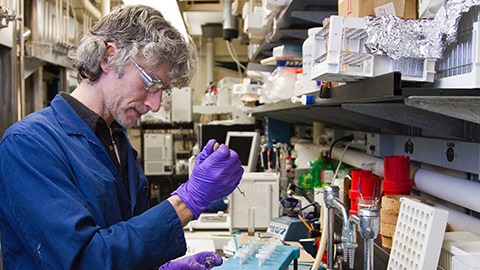Technicians and lab managers play essential roles in academic research labs
This week I’ve been thinking about what to do when you want to stay fully immersed in academic research but don’t want to go down the path toward running your own lab. One option is to be a senior technician or lab manager.
Sometimes people think of a technician position as one you might take for a few years after college, and that can be the case for some people. However, senior technicians and lab managers can play important long-term roles in labs. They can become the lab’s go-to resource for protocols and training, and their essential insights come from working in the lab long-term.

The jobs vary quite a bit. Some focus on the running of the lab, organizing paperwork and reagents, and keeping the lab members up to date with training requirements, while other jobs focus on working on independent research projects, writing up papers, and presenting at conferences. Other still are a mix of all of the above.
The schooling requirements for technicians and lab managers vary. Some jobs require only a bachelors’ degree, while some hiring managers strongly prefer applicants to have a master’s or even a Ph.D.
For someone starting out, The Rockefeller University is looking for a research assistant to study neurophysiology in the fruit fly. This person will carry out brain dissection, immunohistochemistry, confocal microscopy and other experimental tasks as well as assisting the lab manager in the organization and running of the lab. A bachelor’s degree is required.
For the more experienced tech, Case Western Reserve University is looking for a research assistant 3 to act as the lab manager and to carry out protein–protein and protein–lipid interaction studies, develop protocols, and train new lab members. They are looking for someone with at least a bachelor’s, though higher degrees are preferred, and three to five years of experience.
For an experienced tech who would like to work with undergraduates, Providence College is looking for a lab manager to develop protocols and carry out experiments with fruit flies. The lab manager will work with students in the lab and work with the PI to help plan outreach events. A bachelor’s is required, though higher degrees are preferred.
For someone who would like to focus on the organization and running of labs (and less on carrying out their own research), Occidental College is looking for a lab manager to do just that for its biology teaching labs. This lab manager will focus on running and organizing the teaching labs in the biology department. This involves many tasks, including: keeping up to date with safety protocols and animal protocols, managing the animal stocks, maintaining materials that must be created in-house such as DNA preps, and teaching how to properly use equipment such as microscopes. A bachelor’s or master’s is required.
Enjoy reading ASBMB Today?
Become a member to receive the print edition four times a year and the digital edition monthly.
Learn moreFeatured jobs
from the ASBMB career center
Get the latest from ASBMB Today
Enter your email address, and we’ll send you a weekly email with recent articles, interviews and more.
Latest in Careers
Careers highlights or most popular articles

Defining JNKs: Targets for drug discovery
Roger Davis will receive the Bert and Natalie Vallee Award in Biomedical Science at the ASBMB Annual Meeting, March 7–10, just outside of Washington, D.C.

Upcoming opportunities
No matter where you are in your career and what future path you aspire to, everyone needs leadership skills. Join ASBMB for practical strategies for building and practicing leadership skills.

Close out ASBMB 2026 with a bang
The closing reception of the 2026 ASBMB Annual Meeting will be held at the Torpedo Factory Art Center in Alexandra, Virginia.

Redefining lipid biology from droplets to ferroptosis
James Olzmann will receive the ASBMB Avanti Award in Lipids at the ASBMB Annual Meeting, March 7–10, just outside of Washington, D.C.

Creating change in biochemistry education
Pamela Mertz will receive the ASBMB William C. Rose Award for Exemplary Contributions to Education at the ASBMB Annual Meeting, March 7-10 in Washington, D.C.

Trainee mentorship as immortality
Suzanne Barbour will receive the ASBMB Sustained Leadership Award at the ASBMB Annual Meeting, March 7-10 in Washington, D.C.

